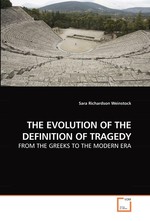THE EVOLUTION OF THE DEFINITION OF TRAGEDY. FROM THE GREEKS TO THE MODERN ERA
Sara Richardson Weinstock
бумажная книга
Aristotle’s POETICS was written in part to define dramatic tragedy, a literary form which has been constantly evolving since. Euripides first altered the standard form of tragedy by ignoring peripeteia. Shakespeare continued the evolution of tragedy by also ignoring anagnorisis and the so- called “three unities.” Ibsen further developed the form by writing entire plays in prose and using the middle-class as subjects for his plays. Brecht dispatched with the notion of catharsis entirely. Miller, Mamet and others wrote plays in a more natural style of speech, including veering into the profane. Miller famously used the “common man” as a protagonist. Over time, each and every one of Aristotle’s original dictums has been shattered, and yet critics and scholars continue to use the Aristotle’s original term: “tragedy.” This book should be especially useful to students of the dramatic form.
Данное издание не является оригинальным. Книга печатается по технологии принт-он-деманд после получения заказа.


